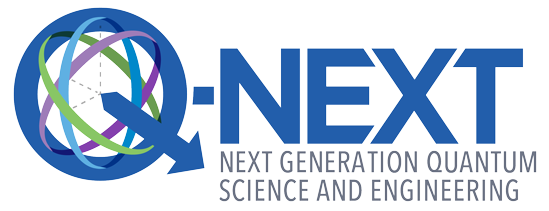In the News
-
The consequences of removing the world largest dam, and building a quantum computer using sound waves
From the Science Podcast: University of Chicago's Andrew Cleland discusses his work on using the phonon as the basis of quantum computing. Read More
-
Run Superstaq to boost quantum computing performance — with Infleqtion
From the Post-Quantum World podcast: Host Konstantinos Karagiannis chats with Infleqtion's Pranav Gokhale about improving the performance of quantum computing programs by orders of magnitude by modifying just one layer of the computing stack. Read More
-
Victor Brar earns NSF CAREER award
From the University of Wisconsin–Madison: Q-NEXT collaborator and UWMadison Associate Professor Victor Brar has earned an NSF CAREER award. CAREER awards are NSF’s most prestigious awards, supporting early-career faculty who have the potential to serve as academic role models in research and education and to lead advances in the mission of their department or organization. Read More
-
IQUIST Scholars: their experiences and how you can become one too
From the University of Illinois Urbana-Champaign: The Illinois Quantum Information Science and Technology Center announces the second year of the IQUIST Postdoctoral Scholar Program. The program gives selected scholars a chance to work with mentors to home in on research areas of high interest to them. Q-NEXT collaborator Jacob Covey, the program’s chair, said, “This program was created to attract talented candidates who may not have otherwise come to the University of Illinois.” Read More
-
The science of light
From Stanford University: Jelena Vuckovic and Jennifer Dionne are featured for their work on photonics research. Read More
-
UChicago, IIT Bombay form new science and technology partnership
From the University of Chicago: The Indian Institute of Technology Bombay and the University of Chicago announced on Sept. 8 a science and technology partnership to promote cooperation in fields such as quantum information science, climate and energy, advanced microelectronics, artificial intelligence and data science. Read More
-
Women of Quantum Technology: Dr. Laura Gagliardi of the University of Chicago
From Inside Quantum Technology: Laura Gagliardi of the University of Chicago and her research team perform quantum chemistry simulations to study renewable energies and predicts chemical systems as potential qubits for the next generation of quantum computers. Gagliardi is also deeply committed to fostering inclusivity in science. Read More
-
Quantum quarterbacks: Pritzker’s a ‘geek’ for computing science that Emanuel calls ‘cutting edge of the next generation’
From the Chicago Sun-Times: Illinois Governor J. B. Pritzker and former Chicago Mayor Rahm Emmanuel are working to boost quantum research in Illinois and in Chicago. Governor Pritzker toured quantum labs at the University of Chicago in July and discussed QIS research with Q-NEXT Director David Awschalom and Q-NEXT members Hannes Bernien and Peter Maurer. Read More
-
Embracing imperfection for quantum technologies
From Physics Today: Q-NEXT Director David Awschalom co-writes a comprehensive rundown of the use of atomic defects as qubits. These solid-state spin qubits are unlocking applications in nanoscale quantum sensing and are at the forefront of creating distributed, long-distance entanglement that could enable a quantum internet. Read More
-
UChicago scientists make new discovery proving entanglement is responsible for computational hardness in quantum systems
From the University of Chicago: In a groundbreaking paper published in Physical Review Letters, a team of scientists led by William Fefferman from the University of Chicago has found a computational problem in which entanglement is directly responsible for a dramatic quantum computational speedup over any efficient classical algorithm. Read More
News and features
See all news and features-
Design rules and synthesis of quantum memory candidates
From the University of Illinois Urbana-Champaign: Researchers use density functional theory calculations to identify possible europium compounds to serve as a new quantum memory platform. They also synthesize one of the predicted compounds, a brand new, air-stable material that is a strong candidate for use… Read More
-
‘Ruler for light’ could enable detailed measurement in personal devices
Frequency combs have revolutionized precision measurement, but the bulky, power-hungry devices are limited to lab settings. A new efficient laser “microcomb” developed by Stanford researchers could bring that revolution to the handheld electronics realm. Read More
-
Resurrecting niobium for quantum science
For years, niobium was considered an underperformer when it came to superconducting qubits. Now scientists supported by Q-NEXT have found a way to engineer a high-performing niobium-based qubit and so take advantage of niobium’s superior qualities. Read More
-
Researchers from startups, government labs and academia develop new techniques for making qubits out of erbium
Argonne project addresses quantum technology challenges and highlight sthe versatility of a rare-earth metal used in lasers and to color glass. Read More
-
Meet Edward Schmitt, facilities engineer
Former Marine Corps electronics technician Edward Schmitt keeps the Argonne Quantum Foundry running while advocating for veterans. Read More
